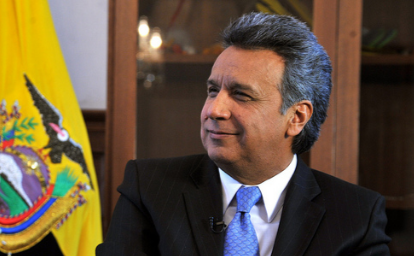Latin America Advisor
A Daily Publication of The Dialogue
Is Ecuador’s Ruling Party Likely to Hold the Presidency?
 Ecuador’s ruling party tapped former Vice President Lenín Moreno as its candidate in next year’s presidential election.
Ecuador’s ruling party tapped former Vice President Lenín Moreno as its candidate in next year’s presidential election.
Ecuador’s ruling party, the Alianza Pais, selected former Vice President Lenín Moreno as its candidate for the upcoming presidential election in February. What are the similarities between President Rafael Correa and his party’s chosen successor? If elected, how might Moreno address the myriad issues Ecuador faces today? Four months ahead of the election, how likely is it that voters will choose another Alianza Pais president, and who are the likeliest opposition figures to face him?
Ramiro Crespo, president of Analytica Securities in Quito: "At their best, Rafael Correa and Lenín Moreno worked in tandem—a bad cop, good cop routine to get what both wanted for Ecuador: a perfect dictatorship with all the trappings of a democracy. At worst, Moreno was too weak to restrain Correa. Moreno speaks softly, but most likely carries the same big stick applied by the authoritarian Correa. Correa’s current vice president, Jorge Glass, who is an unwise choice of running mate for Moreno, is on the Alianza Pais ticket as an impeachment threat, in case Moreno deviates from what Correa wants. Yet if, once in power, Moreno does not drastically change his government team, Ecuador will see the same tragic and incompetent management that has prevailed in recent years. Four months ahead of the election, voters do see that voting for Moreno is like voting for Correa, yet a first-round victory for Moreno is entirely possible, considering that the rules of the game will be skewed toward the current regime, which will no doubt use the entire government’s propaganda machine, in flagrant violation of electoral law. As for the election itself, there is a risk of not having independent observers like the OAS or European Union on hand. If there is a second round, conservative opposition candidate Guillermo Lasso will likely win, assuming that Ecuador’s Social Christian Party is truly part of the opposition and calls on its voters to support Lasso."
Marc Becker, professor of history at Truman State University: "Building on the successes and popularity of Rafael Correa’s 10 years in office, Lenín Moreno and his running mate, Jorge Glas, will easily win the election in February. Alianza Pais has become an effective electoral machine, which assures their victory. The traditional, oligarchical right wing remains divided, and still holds to their discredited neoliberal economic policies that impoverished and underdeveloped Ecuador during its decades in power. Those policies are unlikely to regain much popular support. Much of the opposition to Correa focuses on his famously caustic personality, and in those terms Moreno will enjoy more popularity. Combined with social policies that favor provision of education, health care and other social services to the majority of the population, a new Alianza Pais administration promises to be a success. A more significant opposition to Alianza Pais than the conservatives is the social movement left that opposes economic development policies that are based on the extraction of natural resources. The popular former general and mayor of Quito, Paco Moncayo, is running with the Acuerdo Nacional por el Cambio (ANC). This alliance groups together the center-left Pachakutik and other leftist parties that have lost their ballot access and organizations that had become disaffected with Alianza Pais. In recent elections, a similarly eclectic coalition did not realize much electoral success in the face of the overwhelming organizational power of the Alianza Pais. This election is unlikely to turn out any differently, even though these activists forward an important message of alternative and sustainable economic development models."
Daniela Chacón Arias, city councilor of Quito: "Lenín Moreno has made efforts to show a different personality than President Rafael Correa to build bridges with different sectors that have been isolated by Correa’s style and policies, and also to appeal to the still high percentage of undecided voters. Nonetheless, there are several signs that show continuity between administrations is most likely. Declarations by Correa about not betraying the ‘project’, the need of appealing to Alianza Pais’ core base and the presence of current Vice President Jorge Glas on the ticket as Moreno’s running mate, all play against Moreno’s efforts. If elected, Moreno will face an economic and social crisis that will require the abandonment of several of Correa’s policies and to deal with a strong demand to democratize the decision-making process. It is still soon to tell what will happen in Ecuador’s elections, given that the percentage of undecided voters is around 60 percent. The likeliest opposition figures are former banker Guillermo Lasso (right wing), Congresswoman Cynthia Viteri (right wing) and war hero and former Quito Mayor Paco Moncayo (left wing), who are campaigning to the undecided electorate, though they haven’t yet given a clear view of what their proposed programs and policies would be. In the next month when they finish selecting their running mates and closing political alliances, they will give Ecuadoreans a much clearer outlook."
The Latin America Advisor features Q&A from leaders in politics, economics, and finance every business day. It is available to members of the Dialogue's Corporate Program and others by subscription.



















